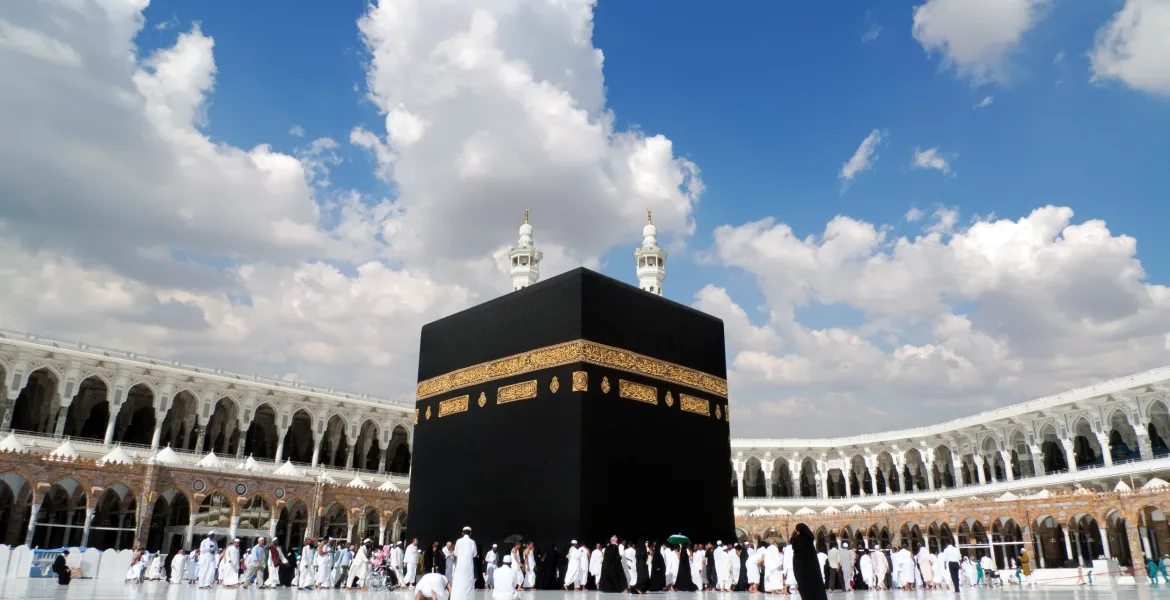In 2009, Public Issue investigated, for the first time in Greece, the attitudes of Greeks towards Islam, the social perceptions of the concepts and symbols associated with the Islamic religion, the degree of knowledge and familiarity of citizens with the Islamic tradition, as well as the existing social beliefs regarding Islam-West and Islam-Greece relations.
Today's findings are compared with the corresponding ones from 2009. It is important that research was carried out shortly before the Greek financial crisis, the appeal to the International Monetary Fund (2010) and the imposition of the memorandum policies. It depicts an entirely different social reality from today's. The key questions of the original survey are repeated in the company's new survey, conducted in December 2023.
In the last two decades, with a turning point in 2016, there was a rapid increase in the migration flows of Muslim populations to Greece, mainly from countries in South Asia and the Middle East. As a result, in the last 15 years (2009-2023), social attitudes in Greece towards the Muslim world have changed dramatically.
Greek public opinion, generally following the pan-European trend, treats the Muslim world clearly more negatively or even hostilely.
A. Attitudes towards symbols of Islam
According to the results of the 2009 survey, more than 5 out of 10 Greeks held a neutral attitude towards traditional concepts and symbols of the Islamic world, stating that they have "neither a positive nor a negative impression" of words associated with Islam, such as: "Arabs" (50%), "Quran" (52%), "Muslims" (53%), "Prophet Muhammad" (53%), "Mosque" (54%) and "Islam" (61%) per se.
However, as early as 2009, words with a more fundamentalist tone, such as, for example, "Burqa", "hijab", and "Jihad", caused a "negative impression" in percentages of 67%, 62% and 53%, respectively. It is a given that traditionally, in the countries of the West, these concepts have always been negatively charged. The "hijab" is considered a remnant of a patriarchal, non-secular society; the "burqa" has become synonymous with the oppression of women's human rights, while "jihad" has been identified with "holy war".
What has changed since then in the way Greek society deals with the increased coexistence with Muslim populations? The findings of today's research prove that a significant ideological change has occurred in the 15 years that have followed. Both the general image of the Islamic religion - the word "Islam" itself (Diagram 1) - and the image of the Muslim mosque (the word "mosque", Diagram 2), but also the image of the Muslim believer (the "person" which the word "Muslim" indicates, Diagram 3), register -distinctly- a shift from the neutral position (does not cause "neither a positive/nor a negative impression") to particularly negative attitudes.
The word "Islam" now generates a negative impression in more than double the percentage, 59%, compared to 23% in 2009 (+36%), the word "Muslim", in percentage 39%, compared to 26% (+13%) and the word " mosque", to 36%, against 23% previously (+13%).
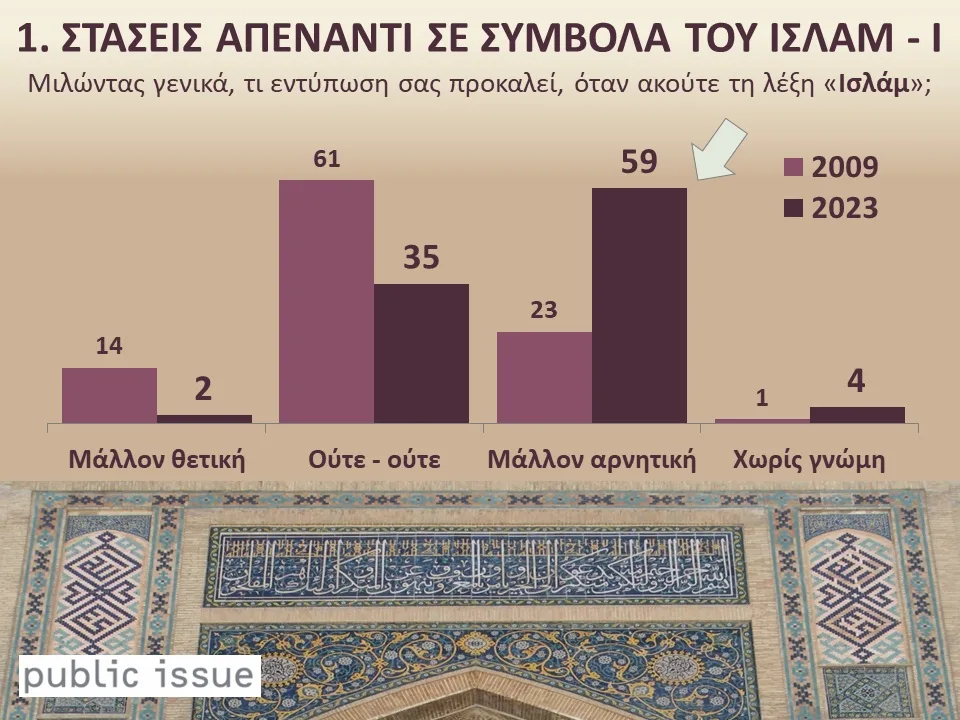
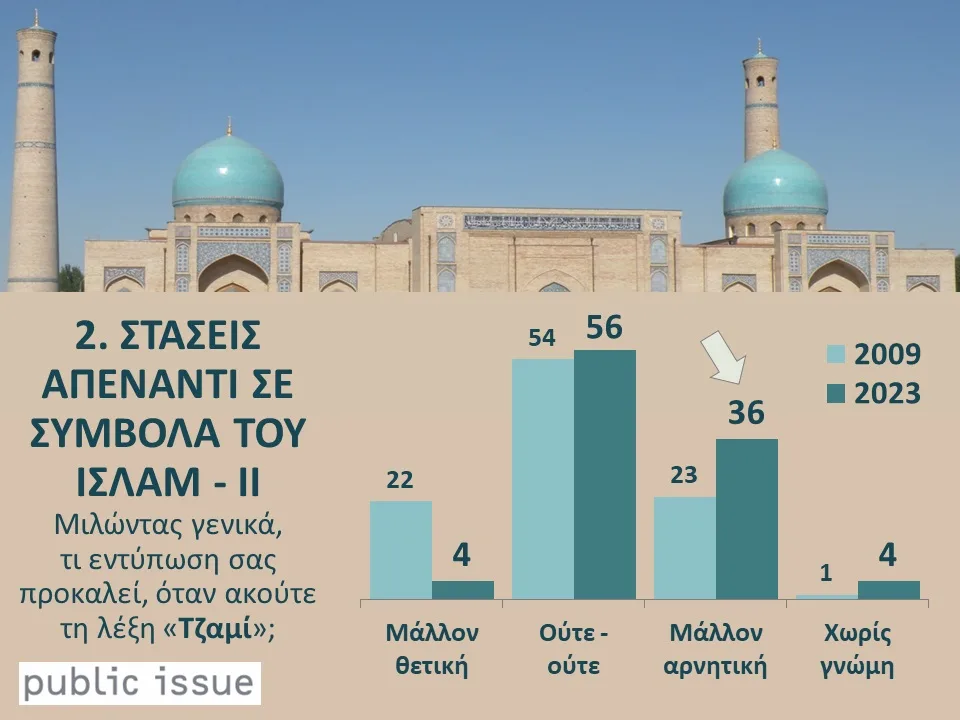
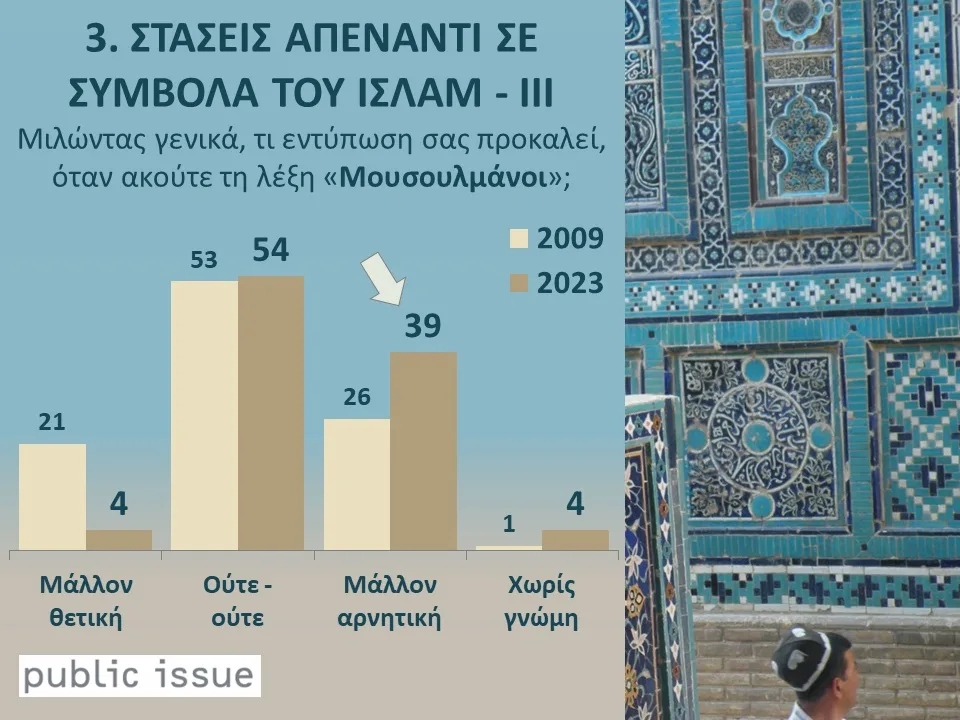
B. Perceptions of Islam (2009-2023)
1. In 2009, almost 1 in 2 Greeks (54%) perceived Islam only as a religion and not as politics. Additionally, 8 out of 10 stated that they "do not know the teachings and customs of Islam" (77%), while an almost equal percentage (83%) stated that they had "never been in contact with the Qu'ran."
Today, in Greece, 51% of citizens, i.e. a percentage similar to that recorded in the 2009 survey, still perceive Islam exclusively as a religion. However, in the 15 years that have passed since the previous measurement, the share of citizens who accept Islam has increased significantly, not only as a purely religious phenomenon but - at the same time - also as a political and cultural phenomenon.
This percentage in Greece concerns 1/3 of public opinion (33%, from just 12% in 2009, Diagram 4).
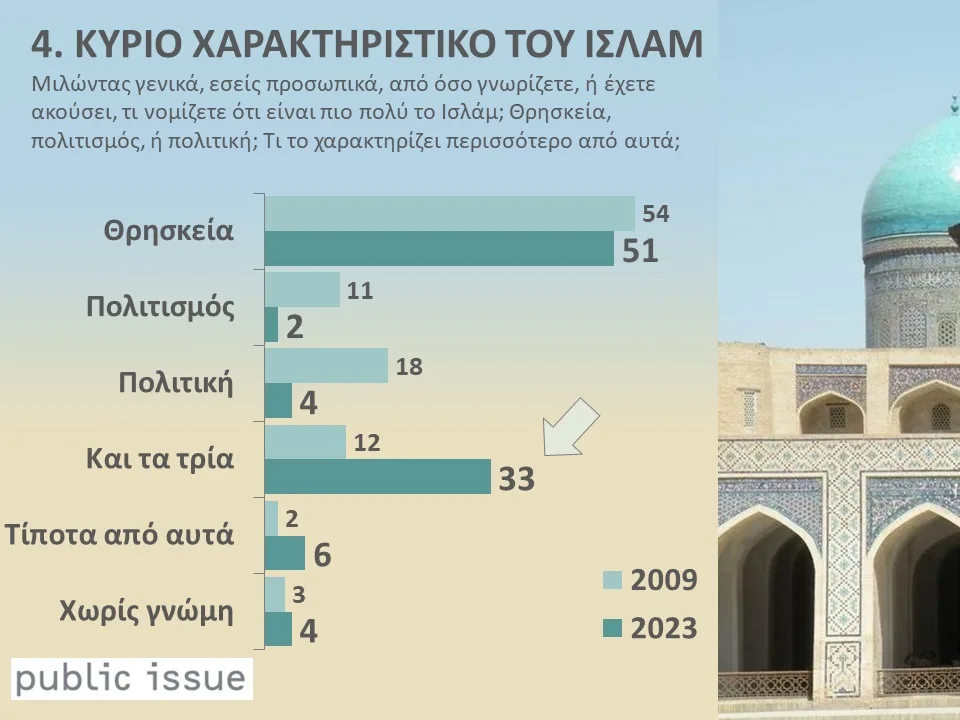
2. With regard to the opinions held by the Greek public opinion, regarding the relations between Islam and the West, it should be emphasised that the perception that Christianity is in "conflict" with Islam is widely established in Greek society. This stereotypical belief was already reflected in the 2009 survey, to the extent that 67% of Greek citizens, i.e. 2 out of 3, believed that there is a "clash of cultures" between Christianity and Islam.
However, in the intervening 15 years since then, all indications are that this trend has strengthened further. Today, the corresponding percentage has significantly expanded (generalised), approaching 79%, i.e. it now concerns 8 out of 10 citizens (Diagram 5).
It is characteristic, additionally, that in 2009, almost 1 in 2 respondents (55%) did not rule out the possibility of a further conflict between Islam and the West in the future.
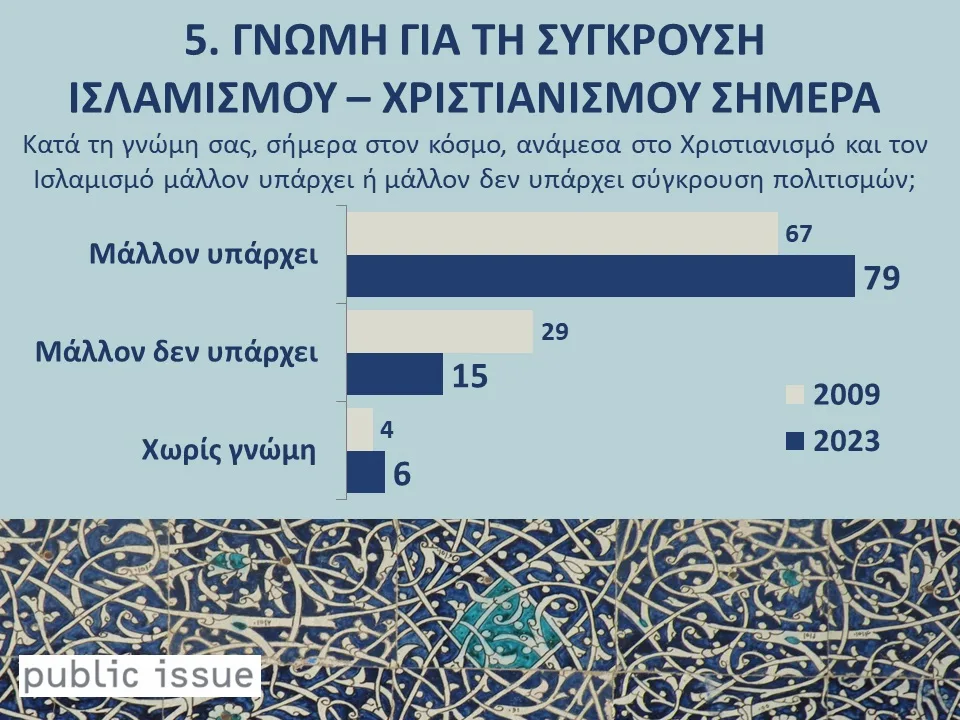
C. Greece towards Islam: Cultural "incompatibility" and fear of the Islamic "danger"
Comparing the results of the two empirical surveys of Public Issue on the existing social perceptions, the finding emerges that there are large and widening differences between Greece and the Islamic world.
In fact, the absolute alienation of the majority of Greek society from the Islamic world, despite the size of the Muslim immigrant populations that have flowed into the country in the last two decades - and probably because of them - has not changed significantly between 2009 and 2023.
Specifically, for the majority of Greek citizens and specifically for 62% of respondents today (63% in 2009), i.e. consistently from 6 out of 10 citizens, the distance that exists between Greece and the Islamic world is characterised as "great".
Moreover, in 2009, there was also a relatively strong opposing attitude - 27% (more than 1 in 4 respondents) considered this distance to be "small" - the corresponding percentage has shrunk today to just 7%. This finding is empirical evidence that cultural "incompatibility" has been enhanced. (Diagram 6).
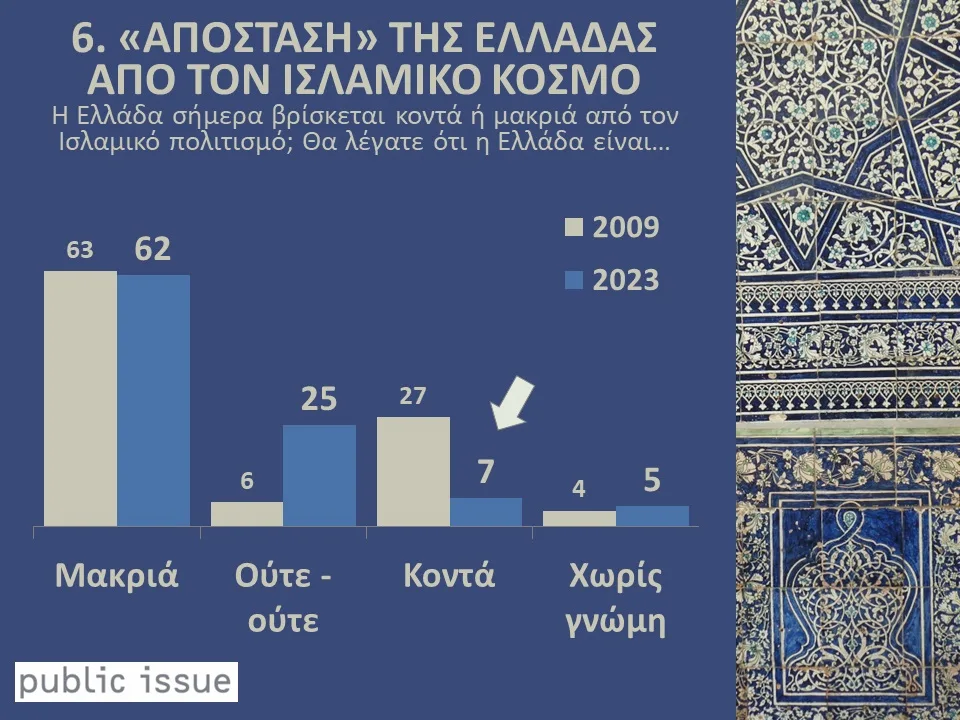
As a consequence of this ideological/cultural "distance", the fear of the so-called "Islamic danger" is strengthened to a certain extent. Although 52%, i.e. 5 out of 10 citizens (7 out of 10 in 2009, 70%), consider Greece is not currently in danger from Islam, the change that occurred in the last 15 years is not negligible.
According to the recent survey, the percentage of citizens who accept that there is an "Islamic danger" has increased from 27% in 2009 to 39% today (+12%) (Diagram 7).
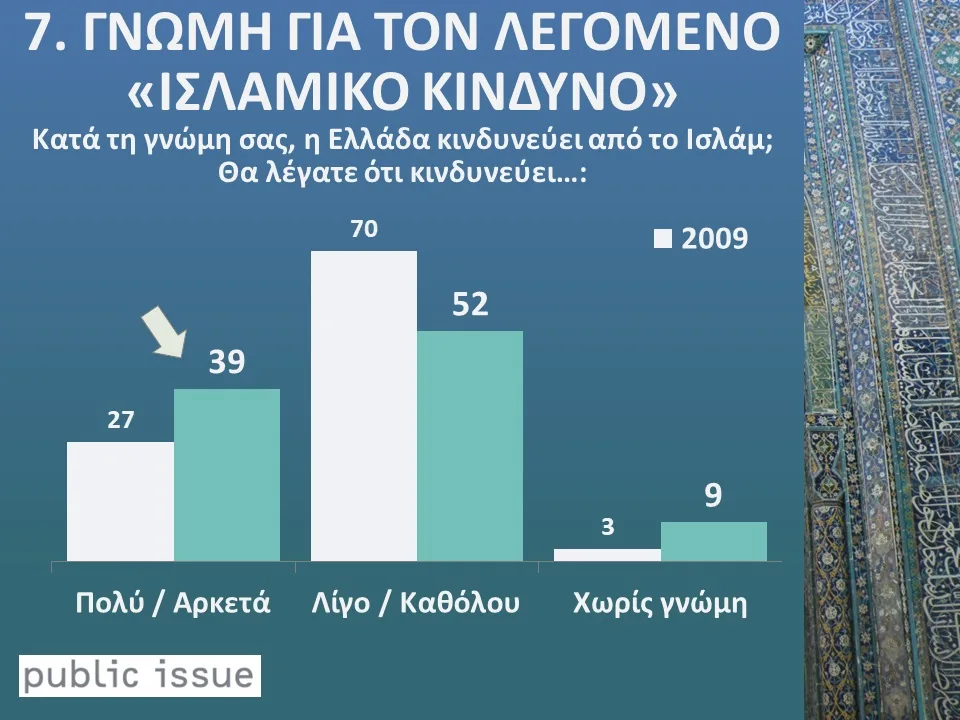
D. Sympathy for nationalities
Diagram 8 shows the attitudes of the Greek public opinion (the degree of "sympathy") towards eight (8) selected nationalities, which are related either to the Muslim immigration flows that Greece accepts or to countries in its geographical surroundings.
According to the findings of the survey, the Egyptians (54%), the Palestinians (44%) and the Syrians (44%) are the nationalities most liked by Greeks today. The positive differentiation of the image of the Egyptians is not only due to the traditionally friendly relations between the two countries but probably also to the recently upgraded diplomatic relations.
In contrast, the nationalities with the lowest level of sympathy are Pakistanis (22%), Afghans (22%) and Iranians (30%). An intermediate position is occupied by the Israelis and the Turks, recording equivalent sympathy, 35% (in 1/3 of the social body).
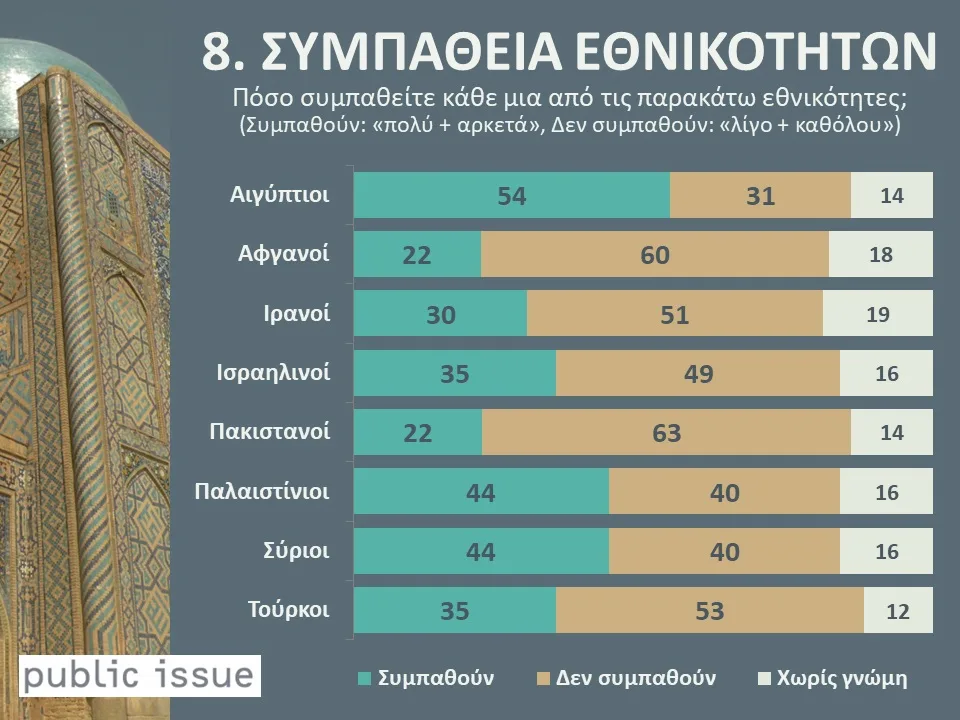
In Diagram 9, the impressive changes and upheavals that have occurred in these indicators over the last 15 years are listed. The comparison remains static since no systematic time series of relevant research data is available.
Consequently, we cannot identify fluctuations that may have occurred over time. A general finding that emerges from the research is that the sympathy of all the nationalities under investigation - with the exception of Israelis - shows a significant decrease in 15 years.
Greek public opinion appears today to be more "introverted" and suspicious of the foreign nations with which it coexists or neighbours.
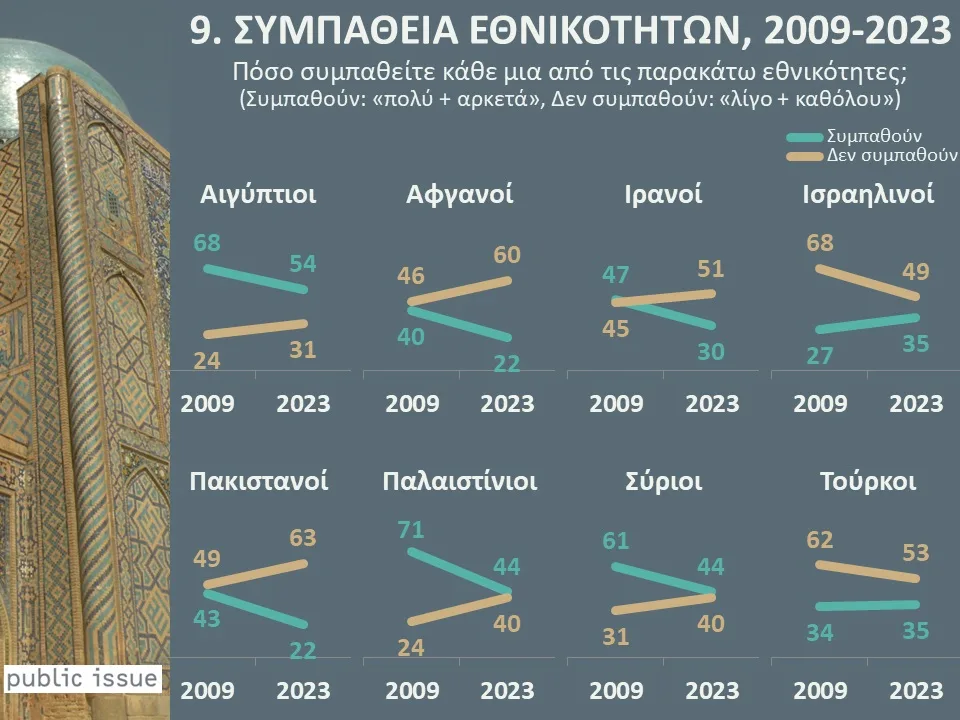
In the image of the nationalities, the image of the Palestinians shows a greater deterioration, - 27%, a trend that undoubtedly constitutes a reversal in relation to what previously characterised Greek public opinion.
This development is not only a result of the current situation (Gaza war) but is also related to more long-term processes and trends concerning the change of Greek foreign policy and the rapprochement with Israel.
Of course, this change has influenced the image that Greek public opinion has of the Israelis today in a positive direction, although it does not overturn its -over time- negative balance ("sympathy" 35%, against "dislike" 49%).
It is pointed out, however, that the improvement in the image of the Israelis, +8%, is also the only distinct positive change observed among the nationalities under investigation, given that sympathy for the Turks remains essentially unchanged (35%, compared to 34% before, +1%).
A significant decrease compared to 2009 is also recorded by all other sympathy indices for Pakistanis, -21%; Afghans, -18%; Syrians, -17%; Iranians, -17%; and even for Egyptians, -14%. The latter remains the only nationality for which the "like/dislike" balance remains significantly positive (+23%) in the consciousness of Greek public opinion.
The differences that appear in the indices of sympathy towards the various nationalities are not interpreted solely on the basis of religious beliefs. With the exception of Iran, where the country's population is 90%-95% Shiite Muslims, the remaining nationalities are all overwhelmingly Sunni Islam (Pakistan 97%, Palestine 93%, Egypt 90%, Turkey 88%, Afghanistan 80%-85%).
However, public opinion towards all these nationalities is obviously different. After all, it is well known that the conflicts between Sunni/Shia Muslims are also irreconcilable. National identities intersect with religious ones.
READ MORE: Crime explosion in Greece – 55% of prisoners are migrants.

